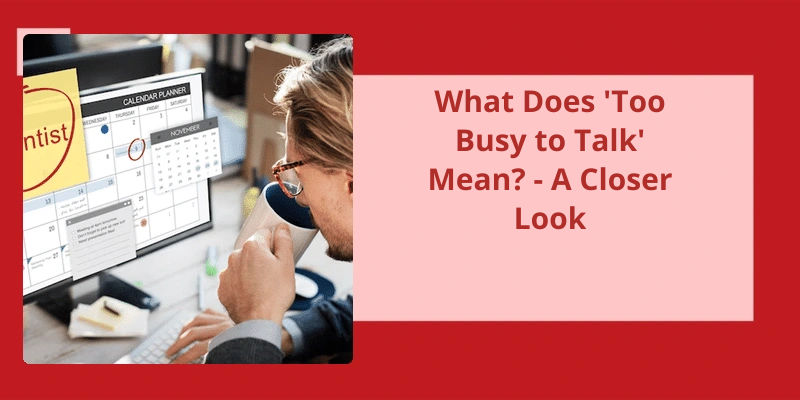In today's fast-paced world, where multitasking and juggling multiple responsibilities has become the norm, it's not uncommon for people to find themselves constantly preoccupied with various tasks and commitments. However, this can often lead to neglected relationships and missed opportunities, as individuals may become too caught up in their own responsibilities and lose touch with those around them. This is where the phrase "too busy to talk" comes into play, used to describe someone who’s so focused on their own tasks and goals that they don't have the time or energy to give attention to others. Whether it's a friend, family member, or colleague, being "too busy to talk" can have negative consequences on our relationships and overall well-being. It's important to remember to prioritize connections and communication, even amidst the chaos of a busy life.
Is Being Too Busy Just an Excuse?
Most of us believe that were too busy to pursue new opportunities or complete our existing goals. But being too busy isn’t the reason. The truth is that we don’t always prioritize our tasks, and were scared of the challenges that come with them. We use being busy as an excuse to avoid new things that might bring us success.
Being too busy is a mindset, and if you let it rule your life, youll never achieve your full potential. You need to be stronger than your excuses. It’s easy to tell yourself that you don’t have time for something when youre afraid to try. Excuses are simply a way for us to avoid our fears, and they’ll only hold us back from our dreams.
To overcome the too busy excuse, you need to identify what your priorities are. Often, we prioritize activities that don’t actually matter in the grand scheme of things. To be successful, you must make sacrifices and start prioritizing the tasks that will help you achieve your goals. You can start by listing down what’s important to you and what you need to do to achieve your goals.
If you truly want something, youll figure out a way to make the time for it. We all have the same 24 hours in a day, so it’s essential to use it wisely. Even busy people have free time that they can utilize if theyre determined enough. You need to take control of your schedule and be disciplined enough to use your time wisely.
We need to be truthful about our priorities and use our time efficiently to accomplish what we truly desire. Once youve identified them, make them a priority and prioritize your tasks based on them. Remember, if it’s important to you, youll find a way, if not, youll find an excuse.
It’s a common dilemma in dating – you’ve been seeing someone for a while, things seem to be going well, but suddenly he drops the bombshell that he’s “too busy” to see you. It’s easy to feel hurt or confused when this happens, but it’s important to remember that there could be a range of reasons why he’s saying this. In this article, we’ll explore some of the potential meanings behind the phrase “I’m too busy,” and give you some tips on how to navigate this tricky situation.
What Does It Mean When a Guy Says He’s Too Busy?
It can be difficult to hear that a guy is too busy. You might feel brushed off or like youre not a priority. But it’s important to remember that everyone has different priorities and schedules. Just because someone is busy doesn’t mean they don’t care about you. It’s possible that he really is swamped with work or family obligations.
However, it’s also possible that hes using “too busy” as an excuse to distance himself from you. This can be a hard pill to swallow, but it’s better to know the truth than to be strung along with false hope. If you suspect this is the case, it’s okay to ask him for clarification. Just be prepared for an honest answer, even if it’s not what you wanted to hear.
Another thing to consider is whether or not youre giving off signals that youre too clingy or needy. If a guy is already feeling overwhelmed with other responsibilities, he may not have the bandwidth to deal with someone who requires a lot of attention. Make sure youre giving him space to pursue his own interests and live his own life.
Ultimately, the best thing you can do is to focus on your own happiness and well-being. Dont put all your eggs in one basket, and don’t wait around for someone who may or may not make time for you in the future. Surround yourself with supportive friends and family, pursue your own hobbies and interests, and remember that someone who truly values you’ll make time for you no matter how busy they are.
Signs That a Guy Who Says He’s Too Busy Is Actually Losing Interest in You
- He takes longer to respond to your messages or calls than usual.
- He cancels plans with you last minute, or doesn’t make any effort to reschedule.
- He doesn’t initiate conversations or hangouts as much as he used to.
- He’s always too busy to spend quality time with you.
- He doesn’t seem as engaged or interested in your conversations or activities.
- He avoids talking about his feelings or future plans with you.
- He stops complimenting or expressing affection towards you as often.
- He starts spending more time with his friends or other people instead of you.
- He doesn’t make an effort to meet your needs or compromise in the relationship.
- He becomes defensive or agitated when you bring up concerns about the relationship.
Source: What He Really Means When He Says He’s “Too Busy” |
While some people genuinely have a lot on their plate, others use the façade of busyness to avoid scrutiny or hide their own insecurities. But what happens when we can no longer hide behind the illusion of too much work?
Why Do People Pretend to Be Busy?
There’s a certain cultural reverence for busyness that’s permeated society, particularly in countries like the United States where the hustle culture is lionized. People who’re able to portray themselves as constantly “on the go” are seen as successful, efficient, and dedicated to their work, while those who appear less busy are often considered lazy or not pulling their weight.
This perception has led many people to feel the need to constantly appear busy, whether they actually are or not. For some, it’s a strategic choice to avoid scrutiny or criticism from bosses, coworkers, or even friends and family. By constantly being in motion, it’s harder for someone to doubt your productivity or question what youre doing.
The rise of digital communication has also contributed to the pressure to seem busy. With emails, messages, and notifications constantly flooding in, it’s easy to appear swamped with work simply by responding to them all in a timely manner. Social media has added another layer of busyness signaling. Instagram and Twitter feeds are filled with posts from people announcing how many projects theyre juggling, how little sleep theyre getting, and how tirelessly theyre hustling to achieve their goals, which can make others feel inadequate if theyre not projecting the same level of busyness.
There’s also an underlying fear for many people that if theyre not busy, their worth or value as an employee, friend, or individual will be called into question. In a society that prioritizes productivity and achievement, the idea of being idle or unoccupied can feel like a personal failure. By pretending to be busy, people are able to maintain an illusion of success and importance that feels necessary to their sense of identity.
However, constantly pretending to be busy can take a toll. Lying or exaggerating your workload to coworkers or friends can create unnecessary stress and lead to burnout or resentment. It can also make it difficult to ask for help or delegate tasks, which can actually hinder productivity and success in the long run.
Ultimately, the cult of busyness often masks a deeper issue: a cultural pressure to define our worth by our output and a pervasive fear of appearing unimportant or replaceable. While appearing busy might offer a short-term band-aid solution, it’s important to address these societal pressures and build a healthier relationship with work, productivity, and self-worth.
The Psychological and Physiological Impact of Constantly Pretending to Be Busy: The Consequences of Chronic Stress, Burnout, and Anxiety on Our Mental and Physical Health.
- Feeling overwhelmed and exhausted
- Decreased motivation and productivity
- Anxiety and depression
- Insomnia and sleep disturbances
- Muscle tension and headaches
- Inability to relax and enjoy leisure time
- Increased risk of cardiovascular disease and other health problems
However, this constant state of busyness can lead to burnout and a feeling of overwhelm. It’s important to find a healthy balance between productivity and self-care. Let’s explore some tips and strategies to help manage our busy lives.
When People Always Say They Are Busy?
This can be seen as a reflection of our modern society where being constantly busy is often equated with success and value. It’s almost as if being idle or having free time is considered a weakness or failure.
However, the constant need to be busy and productive can also lead to burnout and stress. It’s important to find a healthy balance between work and leisure time, and to prioritize self-care and relaxation. This is especially important in our current climate where the COVID-19 pandemic has increased stress levels and blurred the lines between work and home life.
Saying “I”m busy” can also be a way of avoiding social commitments or interactions. It’s a common excuse for declining invitations or not responding to messages. While it’s important to prioritize our workload, it’s also important to make time for meaningful connections with others. Social support is crucial for our mental and emotional well-being.
Moreover, constantly being busy can also lead to a lack of mindfulness and presence in the moment. When we’re consumed by our never-ending to-do lists and schedules, we may miss out on simple pleasures or opportunities for growth and learning. By taking breaks and setting aside time for reflection and creativity, we can enhance our overall productivity and satisfaction with life.
Being busy isn’t necessarily a bad thing, but it’s important to assess our motivations and priorities behind our busyness.
The Impact of Social Media and Technology on Our Perception of Busyness
- Social media and technology have contributed to an increase in busyness.
- Constant notifications and updates keep us engaged and often distract us from the task at hand.
- There’s a pressure to always be available and responsive, leading to a sense of busyness and overwhelm.
- Technology also allows us to work remotely, blurring the line between work and personal time, further contributing to our perception of busyness.
- However, it’s important to recognize that we’ve control over our use of technology and social media and can set boundaries to reduce the impact on our perception of busyness.
Conveying the impression of being occupied when one is actually not is a common practice in today’s fast-paced world. It’s often done to avoid unwanted conversations, procrastinate, or simply to appear more productive. However, pretending to be busy may have negative consequences in the long term, as it could lead to a lack of authenticity and ultimately erode trust in our relationships. As such, it’s essential to evaluate the reasons behind this behavior and assess whether it serves a purpose or not.
What Does Pretending to Be Busy Mean?
When someone pretends to be busy, it can be a way to avoid certain tasks or responsibilities. Similarly, a student might pretend to be busy with other homework assignments in order to avoid doing a particularly challenging task.
By constantly appearing to be busy and working hard, they create the impression that they’re an indispensable member of a team or organization. This can be a way to gain recognition and praise from others.
By appearing to be too busy to deal with certain tasks or requests, a person can put pressure on others to take on those responsibilities. This is often the case in a workplace setting, where a manager might claim to be too busy to deal with certain issues in order to push them onto their subordinates.
Despite the potential benefits of pretending to be busy, it can also have negative consequences. This can be particularly damaging in a work environment, where team members need to be able to rely on one another to complete tasks and achieve goals.
By finding a balance between appearing productive and actually fulfilling responsibilities, individuals can maintain positive relationships with those around them while still achieving their personal and professional goals.
The Psychology Behind Pretending to Be Busy: Why Do Some People Feel the Need to Create This Impression?
- Individuals may pretend to be busy to demonstrate productivity and importance to others.
- This behavior may be rooted in societal pressures to constantly be productive and successful.
- There may also be a fear of being seen as lazy or unproductive, leading to the need to constantly prove oneself.
- It’s important to recognize the potential negative effects of constantly pretending to be busy, such as burnout and strained relationships.
- Learning to prioritize and communicate effectively can help alleviate the need to constantly create the impression of being busy.
Moving on to another important aspect of communication, responding to questions can be tricky at times. One such question that we often come across is “Are you still busy?” Most of us tend to answer it in a particular way without even thinking about it – “Not too busy, what’s going on?” But have you ever thought about whether this is an appropriate response? In this article, we’ll explore different ways to respond to this question effectively.
How Do You Respond to Are You Still Busy?
When someone asks if youre still busy, it’s important to remember that theyre likely asking because they’ve something they want to discuss or ask you about. It’s a common question in both personal and professional settings, and can be a way for people to gauge whether you’ve time to chat or if youre too consumed with work or other obligations.
The best way to respond to this question is to be honest about your level of busyness while also conveying a willingness to engage in conversation. Saying that youre “not too busy” is a good way to signal that youre open to talking but also implies that you’ve some free time. This gives the other person the opportunity to share whatever it’s they wanted to discuss without feeling like theyre interrupting you.
This might be the case if youre in the middle of an important project or meeting, or if you simply need some uninterrupted time to focus on your work. If this is the case, you can say something like “Im sorry, but Im in the middle of something right now. Can we talk later?”
How to Politely Decline a Conversation When You Are Too Busy
When you’re too busy to have a conversation, you may politely decline by acknowledging the person and expressing your current workload. Keep the message brief and offer to connect at a later time when you’re available. Remember to show appreciation for their understanding.
Conclusion
With constant distractions and demands on our time, it's a challenge to strike a balance between work, relationships, and personal needs. While being busy is often seen as a badge of honor, it’s important to remember that meaningful connections with others are an essential part of our lives. So next time someone tells you they're too busy to talk, try to empathize with their situation, but also encourage them to prioritize their relationships and cherish the moments of genuine connection.






